Usually each year, I post a list of my favorite books of the past year. This year I didn’t because time just slipped away from me and after December 31st or so who really cares what books one liked from the old year? This year, though, I thought I’d post some books I’m looking forward to reading in the year to come. These are not necessarily books I think I will agree with, but rather books I look forward to interacting with over the next twelve months. This isn’t an exhaustive list, either, just some books that came to mind as I look over my Amazon wish list (which is where I typically “hold” the titles I want to remind myself to get when they’re published).
I’m splitting the list of books into categories. Today’s post will list the “Politics and Culture” section, and tomorrow I’ll share my list in the “Theology and Life” category.
__________________
Stephen Prothero, Why Liberals Win the Culture Wars (Even When They Lose Elections) [Amazon|B&N]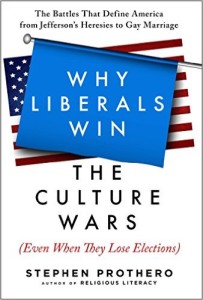
To be fair, this isn’t actually a future book, since I’m reading it now. I’m about a fourth of the way through, arguing with the text all the way along. Prothero argues that the “battles to define America” ranging from Thomas Jefferson’s heresies to anti-Mormon attitudes to anti-Catholicism to the sexual revolution all tell us that culture wars are initiated by conservatives and, ultimately, won by progressives. I’ll have a review of this up soon at The Gospel Coalition.
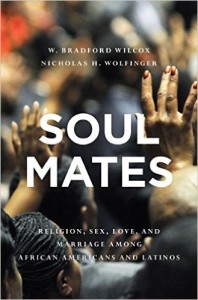 W. Bradford Wilcox and Nicholas Wolfinger, Soul Mates: Religion, Sex, Love, and Marriage Among African Americans and Latinos [Amazon|B&N]
W. Bradford Wilcox and Nicholas Wolfinger, Soul Mates: Religion, Sex, Love, and Marriage Among African Americans and Latinos [Amazon|B&N]
I always pay attention to the work of Brad Wilcox, one of the most thoughtful and groundbreaking sociologists at work today. I expect this work to be especially important because it seems that Wilcox and Wolfinger are not simply dwelling on the bad news (see all the books on the breakdown of the black family). They look at strong American minority families and examine what makes them happy and stable. This could provide valuable insights for churches as we point people to the icons of the gospel embedded in marriage and family.
Robert P. Jones, The End of White Christian America [Amazon|B&N]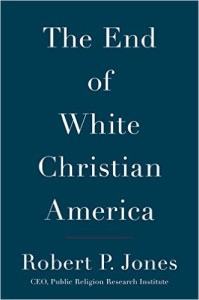
I expect to have much interaction with this volume, which argues that the culture of white Protestantism, dominant through much of the nation’s history, is losing influence due to demography and pluralism. Jones, head of the Public Religion Research Institute, purports to show how “white Christian America” should adapt to the new milieu. I don’t know what Jones will argue, but he has my attention since I’ve been concerned with several of the questions bound up with his thesis. I believe the decline of cultural Christianity demands, first, thanksgiving to God for rescuing us from it and, second, a new form of evangelical engagement. Moreover, I’ve been very concerned about evangelical social witness being confused with or coopted by any sort of white identity politics of grievance and resentment. Jones’ book looks to be an important conversation partner.
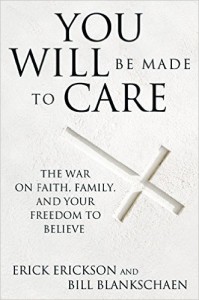 Erick Erickson and Bill Blankschaen, You Will Be Made to Care: The War on Faith, Family, and Your Freedom to Believe [Amazon|B&N]
Erick Erickson and Bill Blankschaen, You Will Be Made to Care: The War on Faith, Family, and Your Freedom to Believe [Amazon|B&N]
My friend Erick Erickson takes up the questions of religious liberty and freedom of conscience and why Christians can’t ignore or disengage from such questions. Even if you don’t see eye-to-eye with the authors on every single controversy mentioned in this book, you can certainly benefit from seeing, as they portray it, the larger picture of the sorts of challenges the church and individual Christians will face.
Matt K. Lewis, Too Dumb to Fail: How the GOP Betrayed the Reagan Revolution to Win Elections (and How It Can Reclaim Its Conservative Roots) [Amazon|B&N]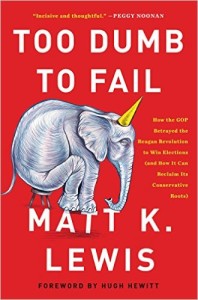
I don’t believe in gambling, but if I did I would have encouraged Matt Lewis to play the Powerball lottery. After all, how could anyone have known when he signed this book contract exactly what would be happening in the Republican primary season in the Age of Trump? And yet, Lewis set out to identify the sort of populist anti-intellectualism seething up through the politics of resentment and identity. Lewis isn’t just an insightful thinker, though; he’s also a fun, punchy writer. I keep hoping he will send me a pre-publication copy of this because I’m not sure I can wait till the end of January to read this.
E.J. Dionne, Why the Right Went Wrong: Conservatism—from Goldwater to the Tea Party and Beyond [Amazon|B&N]
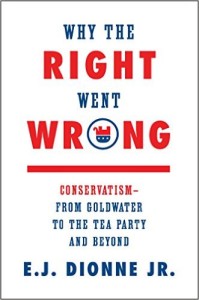 I expect to disagree with a great deal of this book, written as it is by a very liberal thought-leader. That said, I have found several of Dionne’s books (such as Our Divided Political Heart) to be full of some wisdom that transcends even Dionne’s ideological and partisan viewpoints. I expect this book to be much talked about in a presidential election year and I look forward to seeing how Dionne frames the history of conservatism—and whether he gets evangelicals right along the way.
I expect to disagree with a great deal of this book, written as it is by a very liberal thought-leader. That said, I have found several of Dionne’s books (such as Our Divided Political Heart) to be full of some wisdom that transcends even Dionne’s ideological and partisan viewpoints. I expect this book to be much talked about in a presidential election year and I look forward to seeing how Dionne frames the history of conservatism—and whether he gets evangelicals right along the way.
Douglas E. Schoen, The Nixon Effect: How Richard Nixon’s Presidency Fundamentally Changed American Politics [Amazon|B&N]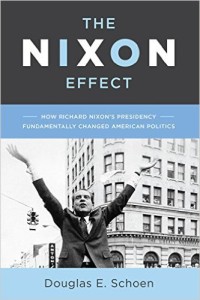
Who could not be fascinated at how this man overcame all obstacles—including personal demons, a presidential loss in 1960, a disastrous career-ending press conference after a gubernatorial loss in 1962—to become president? Who could not be fascinated further by a presidency that included both war in southeast Asia and a diplomatic opening to China, both a landslide reelection victory and the worst scandal to ever engulf the White House, the first to destroy a presidency.
Darrell L. Bock, Life, Liberty, and Loving Your Neighbor: Beyond Gridlock (ChristianBook.com)
Darrell Bock, one of the most respected biblical scholars alive, offers gospel-informed counsel on overcoming the gridlock we see all around us. In an era of cable TV shouting matches and social media wars, we should listen to this wisdom.








